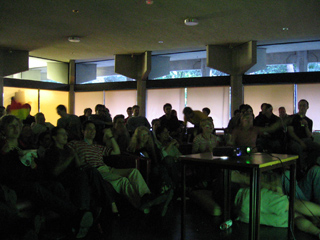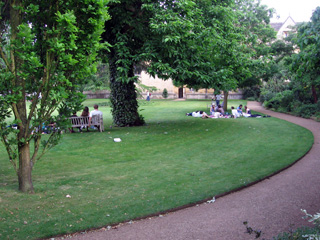This afternoon, I saw Henry Shue give a talk for the Changing Character of War Program on ethics and the targeting of civilian infrastructure – such as power plants – during wartime. While I am sure he put a lot of thought into it, it was not ultimately convincing. Largely overlooked were a number of key factors.
His basic argument was that states can behave morally by leaving enough infrastructure, such as electrical power, to maintain the basic needs of the civilian population. If the state starts with twenty power plants – and it takes three to run basic hospital services, water treatment, and the like – you can morally bomb seventeen, but not eighteen, of them. Even if the enemy state then uses that remaining capacity for military purposes, the moral responsibility of the first state to not imperil large numbers of civilians will be upheld.
The first problem with this is that the re-tasking of such capacity to military purposes is very predictable. In the US, Canada, and UK there was extensive rationing during the second world war. While it didn’t put anyone into a state of desperate privation, that is reflective of the fact that it wasn’t necessary to make such cuts. I am sure people died in the Soviet Union because resources were directed towards the war effort instead. If a state knows that the capacity they leave will be thus re-tasked, how is that morally different from destroying it, from the perspective of protecting civilians? How responsible are states for immoral actions taken by others, but prompted by their own actions and predictable in occurrence? Human security isn’t meant to be about whether the attacking state is blameless or not; it is meant to be about maintaining the lives and human rights of people in general. As a teleological objective, it’s hard to see how such a simple deontological moral axiom holds.
Also, there is the question of what the moral difference is between a civilian noncombatant and someone who has been forcefully drafted. Why is blowing up an apartment block worse than blowing up a barracks full of teenage conscripts? Likewise, there is the matter of how the purposes for which things like power plants are being used can be determined.
Dr. Shue’s analysis did raise and try to address many of these questions, but did not do so in a comprehensive or forceful way. I suspect a more complete answer would require the rejection of some of the rationalist assumptions that underlay his whole analysis. He assumed, for instance, that citizens could choose freely to support their government or not. Likewise, he didn’t give any special consideration to the psychologies of warfare: an element that would need to be included in a normative theory with real-world applicability.
The degree to which such questions are really engaging makes me feel as though I should take his normative theory optional paper next year. It might lead to some excellent discussions.
PS. The talk also reminded me of one of the reasons I thought the Spider Man films were so bad. At one point, Spidey is offered the choice between saving his love interest or a whole tram full of civilians: a real moral dilemma. Instead of having to actually give him such a difficult moral choice – akin to choices made by powerful people and organizations all the time – the filmmakers allow him to use his super powers to save both. Such cop outs, when it comes to grappling with ethical questions, serve no good purpose.




